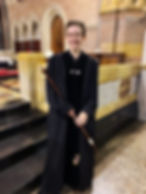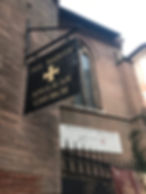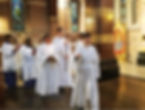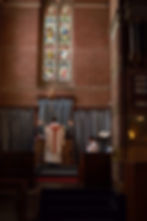Interview by Arthur Dubrovsky. Текст на русском.
Ksenia, as far as I know, you are a postulant in the Church of England (C of E). What does it mean? What exactly do you do? Do I understand correctly that this a stage on the path to ordination?
Literally postulant (from Latin postulare) means "inquirer". It means that a postulant is a person who is asking someone to consider his or her candidature... in my case, for the role of the priest in the Church. Similarly, someone can be a postulant in a monastery or any other religious institution.
A couple of years ago, I expressed my calling to the Church. Since then, my discerning process began: the time given to reflect on the vocation, during which I am serving in the church, as the English say, as a trainee or intern.
De facto it is my third year of service and second year of the official postulancy.
This is a rather long process, but I don't get bored. In comparison, for example, to the Roman Catholic Church, this role in the CofE gives quite a lot of freedom. I am allowed to preach, do some pastoral work, serve on the altar. Basically, I follow the priest in everything he/she does, observe and learn. In turn, the priest observes me and assesses whether I am fit for further training in a seminary.

Tell us about your journey to the Anglican Church. Why did you prefer it to other confessions?
Sometimes I’m asking myself the same question (kidding).
The historical truth is simply that the this is the way the stars have aligned: right place, right time, right people.
From the beginning, because of my theological and other views, for me the 'space for movement' was limited to Orthodoxy, Roman Catholicism and the Church of England. I have never considered other denominations. In this sense, the priesthood was not an absolute end in itself for me, although, of course,
vocation has played its role.
Both my biography (my parents have emigrated) and my education (experience in a Salesian school and then study in the Pontifical university in Rome) have in many ways directed my preferences towards Western theology.
I have warm relationships with Roman Catholics. I love Aquinas very much. But I don't think I was ever really close to "crossing the Tiber" (an idiomatic expression meaning crossing the bridge of the Holy Angel in Rome, that leads close to the territory of the Vatican).
Perhaps, if I had lived 100 years ago, I could have become a Catholic. But today it doesn't make much sense anymore. During my studies, I realized that Roman Catholicism in the form in which it exists today is not for me.
At the same time, I felt the need to finally determine my ecclesial affiliation and end my teenage quest. Non-denominational existence is definitely not my way. While still in Rome, I began to attend the chaplaincy of the Church of England and stayed. The warmth received from the community back then, along with reading classical Anglican authors, had a great influence on me.
Today I think what matters is not the Church you are in, but whether you love her. We must try to love in spite of everything that doesn’t suit us (and these things inevitably exist in any denomination), because we only grow through love and faithfulness.
This, of course, does not mean that we are obliged to blindly comply with everything and close our eyes to injustice.

How did you feel the call to priesthood? What is it like to be a female priest in modern Europe and, specifically, in the Anglican Communion today?
To start with, it is generally difficult to be a priest in today’s Europe. Whatever confession you take - it's hard for everyone and everywhere. It seems that history has not yet seen an era of ideological pressure of such a character as today, that would be generated from within Christianity itself.
At the same time, to me it seems that being a woman priest is not a problem today. In Central and Northern Europe, the normalization of the phenomenon is almost complete. It ceases to be perceived as ‘rebellion’ or ‘feminist resistance’ - and I am very happy about it, because I dread that otherwise the risk of confusing theology and ideology becomes too high.
Personally, for the entire time of the postulancy, I have never met any opposition in the form of acute rejection or, at least, great surprise. More ambiguous feelings were caused not by the fact that I am a woman, but by the fact that I am ‘Russian in the English Church’: “How come? Why are you not Orthodox?”
All in all, my main opposition has always been myself. In the process of discernment, it was very important for me to be sure in the "validity" of the female ordination. It took a lot of sleepless nights and nerves to settle this question.
Talking about feelings, St. Therese of Lisieux, whose spirituality is close to me, has written lines dedicated to her own vocation to sacramental priesthood. I could express myself with same words, had my style been as elegant:
From The Story of a Soul (my translation):
“I feel myself called to be a soldier, priest, apostle, doctor of the church, martyr. Finally, I feel the need, the desire to perform all the most heroic deeds for you, Jesus… I feel in my soul the courage of a crusader, of a soldier for the Church, and I wish to die on the field of battle in defense of the Church […] I feel in me the vocation of a priest! With what love, O Jesus, would I bear you in my hands, when at the sound of my words you came down from heaven! With what love would I give you to souls!”

Besides St. Therese and St. Thomas Aquinas, do you have any favorite writers and / or preachers in modern Anglicanism (C.S. Lewis doesn’t count)? Maybe there is someone from the clergy who inspires you and whom you take as a model?
You can add: Rowan Williams doesn’t count. Both him and Lewis have already entered, so to say, the public domain. They are included in the virtual list of the Christian UNESCO.
I really like the preaching style of Stephen Cottrell, the new Archbishop of York. His writing style is equally admirable. I evaluate it from a journalistic point of view (journalism is my first education). He is able to hold attention perfectly, speaks in a way that is accessible and interesting for a varied audience.
Among the Anglican preachers I also admire Richard Coles and Sam Wells - for the same reasons as Cottrell. I think there is no need to clarify that it doesn’t mean I share their views on all issues.
Generally, I am "omnivorous" - I listen to various podcasts, from Catholic to neo-Protestant ones, and in different languages available to me. I'm interested in everything.
My standards for a usual Sunday sermon are: the shorter the better :-)
Do I have model Anglicans? Yes of course. Not only among the clergy, but among the laity as well. I was lucky to be personally acquainted with Anglicans who enjoyed deep understanding of Christianity and human nature, who pointed me to Christ where it was difficult for me to see Him myself. Hopefully, when I “grow up,” I can in turn become such a signpost for those traveling through this difficult life.

Right, we've talked about you, now let's talk about your Church. What do you think about the prospects of the Anglican Church in Russia? Is it possible, hypothetically, for an independent Episcopal Church in Russia to develop as, for example, in South Korea? And what conditions are necessary for it to happen?
It's a difficult question... I am simply not familiar enough with church politics in Russia. Therefore, everything I say should be taken with an eye to my ignorance.
First of all, we need to understand who would need this church, and why. Would there be sufficient audience? As of now, interest in Anglicanism remains an isolated phenomenon, as far as I can see. For a Christian it is important to have experience of community life. Now, how can Anglicans in Russia experience it, if there are two parishes in the whole country, and those are English-speaking?
But hypothetically, why not? There are religious organisations in Russia whose existence is hard to conceive, and, nevertheless, they exist. So why not an Episcopal Church of the Anglican matrix?
However, if Anglicanism wants to develop in Russia, it will have to be russified. The church must be capable to care pastorally for the people entrusted to her by the Lord. There would be need for priests who have come out of the same environment as the faithful, who would understand Russian soul and culture. The latter means increased empathy, humanity, a spiritual need for honesty and openness, with some Eastern influences on psychology and everyday life. It is a specific mentality that cannot be approached with Anglo-Saxon measures. Any English-speaking person who has lived in Russia for a long time will confirm this.
I think CofE herself would look at the question in this way: the country already has a national Church. We would like the Russian Orthodox Church to change for the better, to finally listen to the needs of people, and youth in particular. We, in turn, will try to make it so that our presence in Russia contributes to this.

And what about Russian-speaking clergy in the Anglican Church? Are there a lot? Can we speak of a Slavic community within Anglicanism, at least the seed of it?
Yes, of course, there are Russian-speaking clergy. Both those who are already ordained and those still on the way. But, seems to me, too little to talk about the Slavic community. It isn’t only about the clergy. Generally, there are few Russian-speaking Anglicans.
It is also true that I may simply not be aware of the existence of many of them.
The fact is that the majority of Russian-speaking Christians who associate themselves with Anglicanism live or have lived abroad. Logically. But, in my opinion, Russian people abroad, especially those emigrated long time ago, do not like to associate themselves with their country very much. Accordingly, they are not always willingly seeking contacts with compatriots.
I don’t know the reasons for it, but it's not connected with Slavism as such, I don’t think. Otherwise, why doesn't it apply, for example, to Ukrainians? They typically have large and strong communities, enjoy wearing vyshivanka (traditional embroidered shirts), etc.
It may sound surreal, but I think that if a Russian community within Anglicanism ever takes shape, it will sooner appear in Russia.
In 2020, due to the [covid pandemic related] quarantine, since March, I began to spend a lot of time online and, through social networks, I got to know people who live in Russia and feel the closeness of their religious outlook to that of Anglicanism.
This is crazy interesting!
First, because they are not from Moscow or St. Petersburg. It is excluded that they have come to the English church, because it is English, etc., that is, for some theologically irrelevant reasons.
Secondly, the fact that they, having a broad theological outlook (and some having theological education), saw in the Anglican organiziation the Church they were looking for and the way they would like the Church of their baptism to look like, ideally. They take the initiative to popularize Anglicanism, translate the Books of Common Prayer and other texts, they discuss. That is, there is a process of conscious elaboration of the Anglican heritage.
I am sure that this process has potential to positively impact the life of Christians in Russia.

What are your views on the Anglican- Orthodox dialogue and its perspectives?
It’s a well-known fact that Anglicanism and Orthodoxy had very good ecumenical relations, almost turning into concrete steps towards some form of unity. Callistos Ware writes about this in a very peaceful, balanced way in his book Introduction to Orthodoxy, written for Western Christians.
Changes that have taken place in many Churches of the Anglican Communion (AC) since the 70’ have, as it were, put an end to these attempts at rapprochement.
One of the reasons Orthodox Christians find CofE problematic is that our Church is a corpus mixtum not only of good and bad church members, but also of different theological and moral points of view.
In turn, Anglicans perceive that, for the Orthodox,"diversity" is something that needs to be resisted rather than supported, since it seems to be a sign of heresy. Naturally, for the Church, that has largely built its ecclesiology on Lockean values of tolerance and acceptance, the position of, say, Russian Orthodox Church may seem to be ossified or even not Gospel-like.
Everyone clearly understands nowadays, along the perimeter of which issues lies the border, that our Churches will never be able to cross, not in this world.
However, it is our duty, as Christians, to develop our peripheral eschatological vision, to look beyond the horizon.
The Church of England has made her choice, and my prayers for her is that she can accept responsibility for the consequences of these choices with the dignity of the Catholic church with ancient Episcopal Sees.
On the other hand, I would also like to see the Orthodox Churches descend from - as many perceive it – the cloud of mysticism to a more sober awareness of the realities of the world they themselves are a part of.
That being said, of course, nothing prevents us from expanding our relationships with each other. Going to a pub with a friend of a different denomination on a Sunday night is the best of ecumenical dialogues.
Besides… I cannot but suspect that we will soon be approaching times when the personal experience of the Cross and communion with Christ will once again acquire more importance than institutional affiliation.

In the Orthodox eyes, Anglican Church has a reputation of a very liberal organization. At the same time, there is a strong conservative opposition within the AC. How would you rate this process from the inside? What is the balance of power, what is the primary subject of controversy? Are there pitfalls in this conflict? Is there a national problem in the AC?
Based on personal experience, I would say that calling CofE a liberal organization is a generalization.
We are Heraclitans: all is flux, nothing is stationary, and the being rests on the unity of the opposites.
But I understand what you are talking about. The problem is that the voices that first reach the international audience are the loudest ones, the most "scandalous" ones. Public opinion is being formed on the basis of discussions around these voices.
Nevertheless, both liberals and conservatives are a part of the Church. My personal experience only confirms this. In some matters, for example, of ecclesial organization, I would call C of E very conservative.
At the moment, the balance of power, I think, looks more or less this way: rather conservative Evangelicals attract a lot of parishioners (many have heard about the HTB). Large, prosperous and wealthy congregations tend to be Evangelical. This part of the Church threatens to remove themselves to a “church within the church” if certain moral views, i.e., about the blessing of same-sex relationships and/or the acceptance of same-sex marriage change. (Similar situation for those churches of the AC that are predominantly conservative).
At the same time, there is also a large number of "liberal" clergy, especially in London and other large urban centers, but they don’t seem to have much power over the Church as an institution.
The official position of the C of E is that if the clergy live in same-sex relationships, they must remain celibate. In theory, a priest can be “defrocked” if he disregards the rules. In relation to the laity, I think, it would be correct to say that CofE sees her mission not in being the guardian of public morality, but in accompanying and guiding people in their life with God, whatever their path may look like.
My personal opinion, largely rooted in Personalism, is that people should feel free to express their views, be they conservative or liberal. As one bishop used to say, "what is not assumed is not healed". The Church, as a mother, must be dedicated to listening and healing everyone. She should be listening to all children instead of helping some hog the covers and pretending that others don’t exist.
I would like the church to have a more human face, even if the two parts of the face can seem to be contrasting, like the face of Christ of the Sinai icon.

Online I have often met members of the AC who position themselves as Western Orthodox. How widespread is this view in reality and how objective is it? Does this cause tension with the part of the AC that associates itself with Evangelism?
Again, it's difficult for me to say anything.
I saw that in Russian social media there is a group dedicated to Western Orthodoxy, but I haven’t had a chance to know them personally.
I think I understand the logic following which one can arrive to the identification of the AC Churches with Western Orthodoxy, it is clear to me, but I don’t want to speak for others.
Just a couple of days ago, I had a chance to discuss the concept of Western Orthodoxy with an Anglican professor. From his words it appears that the very idea of Orthodox Anglicanism exists, but doesn’t seem to be realistic anymore. From 1545 to 1940 it was still possible to speak about the Orthodoxy of the Church of England, and there was some truth in it. There was great interest in patristics, respect for traditions and beauty of the liturgy. This persisted in some form even until the 70s, but today it would seem that one needs to be an idealist to seek Orthodoxy in the CofE.

Thank you! Final question: could you name three (+/-) most relevant books for Christians of our time? Except for the Bible. Some books that would be good for everyone to read today, in your opinion.
I cannot speak for everyone. Christians today are very different.
One thing I can say for sure - the entire Christian heritage keeps something relevant for us, simply because the main issues have not changed much over the course of two thousand years. Therefore, I am always in favor of not limiting our search for inspiration only to the 20th or, God forbid, only to the 21st century.
Naturally, not everyone is ready to put “The Imitation of Christ”, “Confessions”, or “Fear and Trembling” on the bedside table. But there are classics accessible to everyone, such as The Chronicles of Narnia, The Lord of the Rings, Father Brown ... As a teenager, I was greatly influenced by the Name of the Rose. All these are works of literature that helped many to understand Christianity.
Interview prepared for the“1080 diary” Blog and “1080 diary” Telegram Channel.